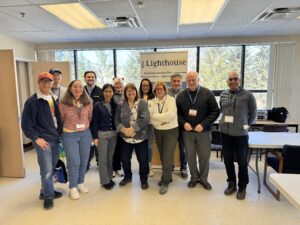Lighthouse, a Pontiac-based nonprofit dedicated to building equitable communities that alleviate poverty, is pursuing plans to redevelop its headquarters at 46156 Woodward Ave. in Pontiac into the Lighthouse Central Campus – a strong, centralized base of operations, and a “one stop shop” for Oakland County residents in need.
Pending site plan approval, construction for the estimated $20M project could begin in 2024 and be complete by 2025.
The campus spans two blocks between Woodward Avenue and Center Street, bordered by Cottage Street to the north and Park Place to the south. It incorporates several properties Lighthouse already owns and includes several key elements designed to address the community’s most pressing needs. Plans include:
A Housing Opportunity Center, with short-term interim housing in apartments and private quarters, along with meals, community building, case manager support and more. The safe, private environment will permanently increase Lighthouse’s short-term shelter capacity to 150 beds, to serve an estimated 600 people each year in a more dignified way.
- For those experiencing homelessness, short-term shelter is a pathway to permanent housing, supportive services, and long-term stabilization. Children and families are turned away from emergency shelter in Oakland County every single day because there are not enough beds to meet the current need.
- Seventy-five percent of Lighthouse shelter guests exit successfully into housing. Ninety percent of clients enrolled in Lighthouse’s year-long follow-up care program retain their housing.
A Social Supermarket, where residents can shop free of charge for the food and other essential items they need, while connecting with a social worker who can help them access additional stabilization services. This will replace Lighthouse’s small pantry in Pontiac and enable expanded distribution to serve more satellite locations in Clarkston, Southfield, Royal Oak and Ferndale.
- According to Feeding America, 12% of Oakland County residents experienced food insecurity in 2022. That’s nearly 150,000 residents, including 29,210 children under the age of 18.
- During the pandemic, the number of people served by Lighthouse’s emergency food program increased dramatically from 10,000 annually to more than 27,000 in 2021. Families and individuals receive customized food boxes, curbside pick-up, home delivery, and distribution throughout the county.
Multiple community spaces, where guests can gather to eat and connect, and community/congregation partners can host activities, provide support, and create opportunities for volunteer engagement. Spaces include: a dining center featuring a multi-use dining area and commercial kitchen, administration headquarters, and an indoor-outdoor community event space and terrace. A cafe concept is also in development to support a range of uses for the venue.
An Economic Opportunity Center, where those in need can connect to social workers, access computers, receive financial and employment coaching, and more. This will help an estimated 1,500 people per year.
“The Lighthouse Campus is a truly game changing opportunity for us to provide a long-term, sustainable response to the poverty and inequity impacting thousands of people in our community,” said Lighthouse CEO Ryan Hertz. “Poverty is a real – and growing – problem in Oakland County. This campus will help us better address the lack of affordable housing, public transportation, and support services that threaten the health and vitality of our entire community and local economy.”
Lack of affordable housing has become an increasingly serious problem nationwide, and Michigan is no exception. According to the Resilient Homes Michigan coalition, Michigan is short 203,000 affordable housing units statewide. As more low-income families compete for a dwindling number of affordable rental units, it’s harder than ever for individuals and families with low incomes to find housing, and they’re stretched thin paying the rent.
While Oakland County is one of the highest income counties in Michigan and has ranked among the wealthiest counties in the nation, data shows more than 150,000 Oakland County residents are unable to afford adequate housing, food, or transportation. At least 3,000 people experience homelessness each year. Of those, 24% are children, and more than 1 in 11 kids in Oakland County are food insecure, meaning they don’t have reliable access to affordable, nutritious food. [Sources: United for ALICE, Alliance for Housing, and Feeding America]
“For too long, the problem of poverty has been ignored in our community. But we can’t ignore it any longer,” said Lighthouse board president Richard Lewnau. “COVID is still having a lingering effect on so many families. Add to that inflation and skyrocketing costs of living – all these things have left more people than ever struggling to make ends meet. The Lighthouse Campus will provide a convenient place for residents to receive the support they need.”
In addition to Lighthouse’s own leadership staff and the project’s architects at Fusco, Shaffer & Pappas, Inc., the campus redevelopment team includes Joe Heaphy of Ethos Development Partners, Colleen Peters of Meaningful Impact Consulting, and Rachel Decker of Detroit Philanthropy.







